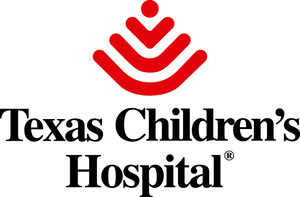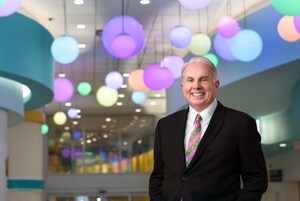Texas Children's Hospital is First Pediatric Hospital in the Nation to Implant Artificial Heart
Adolescent is 1 of only 3 congenital heart patients nationwide to receive artificial heart
HOUSTON, June 29, 2011 /PRNewswire/ -- Texas Children's Hospital in Houston announced today that it is the first pediatric hospital in the United States to implant an artificial heart into the chest of a 17-year-old patient as the only option to save his life. The history-making patient underwent a rare 15-hour operation on May 22 and is currently recovering at Texas Children's Hospital. He is one of three congenital heart patients in the nation to get such a device. To view a video of the teen's journey, please see: http://www.youtube.com/watch?v=Svm_2-KWPN4.
To view the multimedia assets associated with this release, please click http://www.prnewswire.com/news-releases/texas-childrens-hospital-is-first-pediatric-hospital-in-the-nation-to-implant-artificial-heart-124710884.html
Jordan Merecka, born with his heart on the wrong side of his chest (dextrocardia) and his heart vessels backwards (corrected transposition of the great arteries) underwent heart surgery at Texas Children's Heart Center, where he was implanted with the SynCardia Total Artificial Heart, a pulsatile blood pump that mimics the pumping action of the native heart. The Total Artificial Heart was implanted in Jordan as a bridge to donor-heart transplantation.
"The patient's overall condition had deteriorated rapidly," said Dr. David L.S. Morales, pediatric cardiovascular surgeon at Texas Children's Heart Center, who performed the surgery. "Jordan was waiting for a donor heart, but both ventricles and two of his valves were failing, and we were running out of time. The artificial heart, which was immediately available when this patient needed it most, could take care of all of these problems with one operation," said Morales, also associate professor of surgery and pediatrics at Baylor College of Medicine (BCM).
Similar to a heart transplant, the patient's native heart was removed and replaced by the Total Artificial Heart. It is pneumatically driven by precisely calibrated pulses of air and vacuum. The pump is a long-term device designed for a broad range of advanced-stage heart failure patients who might die before a donor heart becomes available.
"Because both ventricles of his heart were failing, a typical left ventricular assist device would not work for this patient. He needed a new heart and none was available as his life was ebbing away," said Dr. Jeffrey Dreyer, medical director of cardiac transplantation at Texas Children's Hospital. "After Jordan's condition worsened to the point that he could no longer breathe without a ventilator, the cardiologists and cardiovascular surgeons weighed the limited possibilities. Morales recommended that the Total Artificial Heart would be the best option for him since more traditional forms of mechanical support would have required two of his valves to be replaced."
"He will still need a donor heart, but we now have time to wait for the best match," said Dreyer, also associate professor of pediatrics (cardiology) at BCM. . "The artificial heart will improve his overall health and allow him to enjoy increased activity during the wait for a donor heart."
Jordan's story
Jordan was born with multiple congenital heart defects, including dextrocardia, or a "reversed" heart. As a child, he experienced two open chest surgeries. Later, he received several surgical revisions and an implantable defibrillator. But, in September 2010, Jordan's heart began to fail and he was placed on a waiting list for a heart transplant. With medical treatment, he was able to attend school as he waited. In April 2011, his health took a turn for the worse and he was admitted to Texas Children's Hospital with heart failure symptoms and kidney insufficiency. He was in critical need of a heart transplant. Weeks passed as he waited for a donor heart and made multiple visits to the cardiovascular intensive care unit. Over the weekend of May 21, all of his organs began to fail acutely and he could not even breathe on his own since his heart was so week. On May 22, Jordan received the Total Artificial Heart that saved his life. He still remains on the heart transplant list.
Texas Children's Heart Center – a leader with heart-failure devices
Earlier this year, Texas Children's Hospital became the world's first pediatric hospital to complete the first and second phase of certification to implant the SynCardia Total Artificial Heart as a bridge to transplant for their patients. The 15-member training team, which included cardiologists, critical care intensivists, anesthesiologists, nursing specialists and hemotologists, was led by Dr. David L.S. Morales, also director of mechanical circulation support at Texas Children's Hospital. The certification prepared the team for Jordan's life saving implantation of the Total Artificial Heart.
Since 2004, when Texas Children's Heart Center implanted the first MicroMed/DeBakey Child Ventricular Assist Device (VAD), the hospital's pediatric cardiac experts have been committed to saving the lives of patients whose hearts are failing through the use of mechanical devices, when needed. Texas Children's Hospital heart failure program presently uses six different types of mechanical circulatory support devices so that no matter what the cause of a child's heart failure or their size and weight, we can use the best device for that individual patient.
The devices include the Berlin Heart (the only VAD for babies and younger children), the HeartMate II for adolescents and teens, plus the RotaFlow, Tandem Heart and Thoratec Paracoporeal VAD.
Jordan's future
For many years after his early surgeries, Jordan was able to live an active childhood. As a teen, he enjoyed hunting and fishing with his father, and at school, he participated in Future Farmers of America program.
At the start of 2011, the senior at Cypress Woods High School was looking forward to three major milestones in his life: his prom on May 27, his eighteenth birthday on May 29 and his graduation on June 5. Being hospitalized, Jordan missed his prom, but thanks to a diligent heart-failure team and the availability of the artificial heart, he celebrated his birthday at the hospital on May 29 -- a week after his surgery. On June 5, Jordan watched his graduation ceremony online while his 16-year-old sister walked across the stage to accept his diploma on his behalf. His class rose to their feet for a standing ovation. Jordan eventually hopes to attend Texas A&M University Galveston to study marine biology.
"Having Jordan up and around again is the best gift in the world," said Suzanne Merecka, Jordan's mother. "He's had such a fighting spirit through this whole struggle. His father and I are happy that Texas Children's could offer a life-saving option when things looked very grim. He still has a heart transplant in his future, but the artificial heart will help him to get stronger and be ready."
For more information on Texas Children's Heart Center, please see: www.texaschildrens.org/carecenters/heart/
About Texas Children's Heart Center
Texas Children's Heart Center is a self-contained pediatric heart treatment facility within Texas Children's Hospital. Its unique design provides a single point of care including examinations, echocardiography, heart catheterization, congenital heart surgery and intensive care. This special setting enhances the continuum and delivery of care. The Heart Center sees more than 19,000 patients and performs more than 800 surgeries annually.
About Texas Children's Hospital
Texas Children's Hospital is committed to a community of healthy children by providing the finest pediatric patient care, education and research. Renowned worldwide for its expertise and breakthrough developments in clinical care and research, Texas Children's is nationally ranked in all ten subspecialties in U.S. News & World Report's list of America's Best Children's Hospitals. Texas Children's also operates the nation's largest primary pediatric care network, with more than 40 offices throughout the greater Houston community. Texas Children's is completing a $1.5 billion expansion, which includes the Jan and Dan Duncan Neurological Research Institute; Texas Children's Pavilion for Women, a comprehensive obstetrics/gynecology facility focusing on high-risk births; and Texas Children's Hospital West Campus, a community hospital in suburban West Houston. For more information on Texas Children's Hospital, go to www.texaschildrens.org. Get the latest news from Texas Children's Hospital by visiting the online newsroom and on Twitter at twitter.com/texaschildrens.
About SynCardia Systems, Inc.
SynCardia Systems, Inc. is the Tucson-based manufacturer of the world's only FDA, Health Canada and CE approved Total Artificial Heart: the SynCardia temporary Total Artificial Heart. For additional information, please visit: http://www.syncardia.com
Related Links:
Contact: Carol Wittman
832-824-2040
[email protected]
SOURCE Texas Children's Hospital
WANT YOUR COMPANY'S NEWS FEATURED ON PRNEWSWIRE.COM?
Newsrooms &
Influencers
Digital Media
Outlets
Journalists
Opted In






Share this article